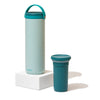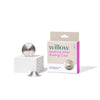If you’re in the thick of new motherhood, you know one thing for sure: This sh*t is hard! Seriously. There has hardly been a new mother in existence who took to her new, maternal role with total ease and without any strife (unless she had insane amounts of help—like live-in nurses, nannies, butlers and massage therapists). Let’s just say there’s a lot of work involved in new motherhood—like a lot—so if you’re finding yourself struggling to keep up with your day-to-day, let alone find 5 minutes of peace and quiet that doesn’t involve someone suckling at your nipple, we get it—and we’re right there with you.
Thanks to the immense demands placed on new mothers from nearly every facet of their lives, self-care—the simple task of caring for yourself—is absolutely paramount during the postpartum period and well beyond. Unfortunately, this basic and fundamental task feels almost unattainable for most moms. “So many new moms are dehydrated, exhausted, shoving cold leftovers into their mouth as they hold their baby (or have their baby strapped to them), and find themselves feeling very much alone,” explains Saba Harouni Lurie, L.M.F.T., Licensed Marriage and Family Therapist and owner and founder of Take Root Therapy in Los Angeles. Because of this, she notes that self-care can feel like the least important thing on your to-do list, when it’s really one of the most important.
Why is self-care so important, especially for moms? Self-care gives back to you in the form of energy, peace of mind, relaxation and rejuvenation so that you can then give more to the people in your life who depend on you, like your demanding newborn, partner, family and friends. “If you focus on your own self-care, it will help you choose the outcomes you want,” says Alan Lindemann, M.D., obstetrician, maternal mortality expert and co-author of Modern Medicine: What You’re Dying to Know. “Without attention to self-care, you are likely to lose control of many of the decisions you would like to make for yourself, which then affects those around you.”
Burnout is also very real when you’re in the new motherhood phase of your life and can be a major roadblock in the way of you achieving the self-care you need. Burnout can manifest in many ways and is a syndrome that results from being overworked and over exhausted—aka the definition of new motherhood.
Though it can be hard to carve out time for self-care, here are some expert-approved suggestions for making it a priority.
1. Ask for what you need.
This might sound simple but, when you’re in the thick of it, this can be one of the most difficult things to do. This is especially true if you’re a nursing mother. Put quite simply, no one can really help you nurse your baby but you. That pressure to be your child’s only food source, especially when they’re feeding every two hours (or more like every 20 minutes), can be immensely overwhelming. But don’t forget that you are human—you’re not really a superhero, even though you probably feel like one. You’re also still recovering from one of the most physically, mentally and emotionally challenging experiences ever: pregnancy and birth. “Having enough time to take care of yourself is not only normal, but it may be necessary to ensure that you have the emotional and physical energy required to care for your child,” notes Harouni. “Aside from the essential aspects of self care, which include time to care for your hygiene, your need for rest, and of course the need to eat and drink, the other seemingly trivial ways that you used to take care of your needs are also important.” One of the best things you can do for yourself, your baby and everyone else in your life is to ask for help. See if a friend or family member could come over for even 30 minutes so that you can do something for yourself during that time. And remember, showering isn’t self-care—it’s a basic necessity—so use the time to do something a bit more relaxing.
2. Remember that self care is an integral part of parenting.
It’s easy to think of self-care as something “extra,” but, in reality, it’s a very important and fundamental aspect of parenting. “Your ability to be a healthy and positive presence in your child's life is inexorably linked to your own mental health and well being,” says Harouni. “It can feel normal to want to drop everything in your life that's not related to your newborn, but maintaining a social life, spending time doing things that fulfill needs beyond nurturing, and continuing to make space for emotional and physical intimacy in your relationship will only ensure that you have more gas in the tank to be a parent.” She also points out that taking the time to care for yourself will also set a (very early) positive example for your child that it's important to prioritize your own well being at times in order to be the best version of yourself in all aspects of your life.
3. Get creative.
“The rather chaotic nature of caring for a newborn means that it can be difficult to find time and plan for self care—i.e. a baby doesn't know when you need some ‘me time’ and when your needs and your baby's are in conflict, it can help to get creative in order to fit self care into your schedule,” says Harouni. “This could look like changing your night out with friends to an afternoon with friends (and your baby) at the park or even shifting what used to be your morning run into a brisk mid afternoon walk to help settle your baby for a nap.” However you choose to incorporate self care into your routine, she urges new parents to make it a priority to ensure that it is something sustainable that you feel you'll be able to continue.

















